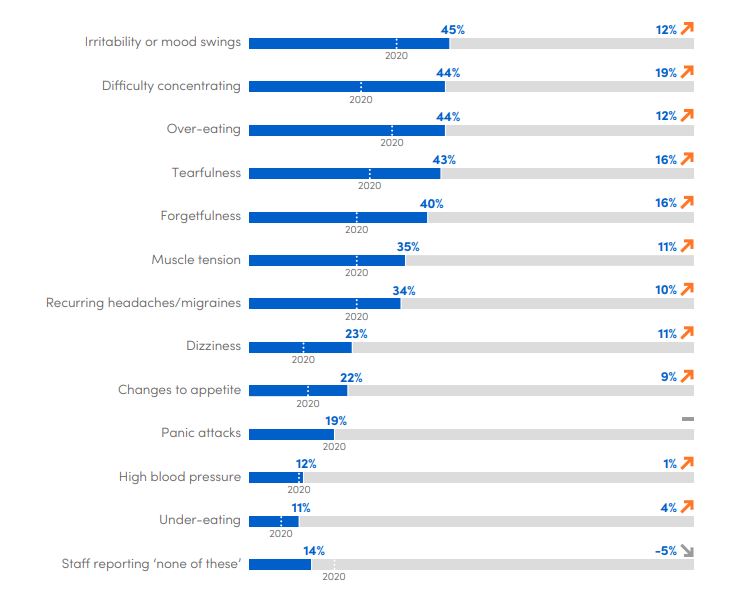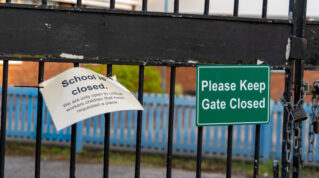The proportion of school staff citing Covid as a factor contributing to poor mental health has almost doubled this year, despite the pandemic appearing to be “over for the wider community”, a new report has found.
The charity Education Support has released its annual teacher wellbeing index study today which reveals teachers’ mental health is worse in certain areas compared to the height of the pandemic.
In 2021, 62 per cent of school staff said the pandemic had contributed to poor mental health – up from just 33 per cent in 2020.
However, work-life balance and excessive workload were the most common work-related issues for staff, at 66 and 64 per cent respectively.
The report is based on surveys of over 3,300 education staff.

Sinéad Mc Brearty, chief executive of Education Support, said the findings show “education staff continue to face impossibly high demands and are suffering as a consequence.
“The pandemic may appear ‘over’ for the wider community but this report shows that isn’t the case for teachers and senior leaders…the pressure has ratched up further”.
The report also found 77 per cent of school staff experienced symptoms of poor health linked to their work – up three percentage points from the previous year.
More than half of staff, 52 per cent, experienced insomnia or difficulty sleeping – a rise of 13 percentage points compared with last year.
Symptoms such as mood swings, over-eating, tearfulness, migraines and dizziness all saw an increase of over 10 percentage points.
Just under four in ten senior leaders said their symptoms were a sign of exhaustion, up from 27 per cent in 2020.
A further third of senior leaders said the symptoms were a sign of burnout.

Dr Patrick Roach, general secretary of the NASUWT teachers’ union, said the pandemic “has, for many teachers, simply made a desperate situation even worse”.
“Teachers cannot simply be expected to soldier on. No teacher should be expected to sacrifice their mental or physical health to do their job.”
Education Support is calling on the government to reduce the volume of workload and recognise the high pressure environment in schools.
In May, the government outlined 12 commitments under a new education staff wellbeing charter.
Promises included driving down unnecessary workload and improving access to mental health support.
A Department for Education spokesperson said it was “incredibly grateful for the efforts of teachers and school leaders” during the pandemic and has “taken a wide range of action to support the wellbeing of staff “.
This includes investing £760,000 in an Education Support scheme to provide one-to-one counselling and peer support to around 2,000 school leaders, they said.
















As a school leader it feels we are asked to push our amazing staff to do more at the most difficult time any of us have faced.
This is a time when recruitment is massively challenged … it is hard to fill many positions, which in turn can put further risk on all at school.
The pandemic has exaggerated the pressures on schools, particularly in special education. The expectations of what we can achieve and offer are being raised externally, when trying to recover should be paramount!
We are now trying to deal with the challenges we have always had, whilst trying to solve a further complexity brought on by the loss felt due to the pandemic, which research tells us will have a much longer impact for young people with additional needs.
The funding system (SEND base funding per pupil has not changed for a decade whilst mainstream continues to increase as it should with inflation) is not just something now that we try hard to navigate as leaders to get the best for our young people, but is now a barrier to inclusion and life chances of young people with additional needs!
The pressures being put on school leaders following this unprecedented period of time will only serve to grind down and see people leave the profession I love!
Compare funding focounsellors compared to funding for inspectors and it is apparent where the government’s priorities lay. The belittling of school staff by Ofsted inspectors is absolutely shocking and should be stopped immediately. Ofsted inspectors’ denial of the fact that schools are now face to face with the pandemic is appalling. Given that they have been sat at home for the last 18 months produce reports of little kudos based on outdated research, it’s no wonder they want to get back out there but they are out of touch with reality. Perhaps inspectors could be assigned to schools for a few weeks at a time in an advisory/supportive and fact finding tole, rather than bull-dozing staff’s mental well-being to the extent where they are going to trigger a teacher shortage as disheartened and broken experts leave the professional in their droves.